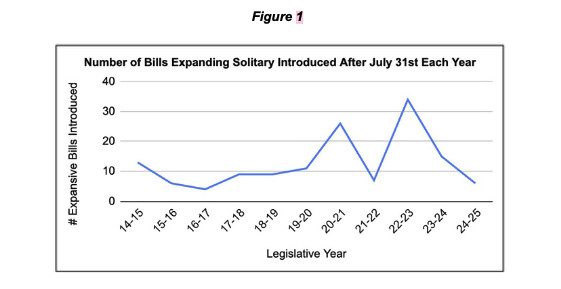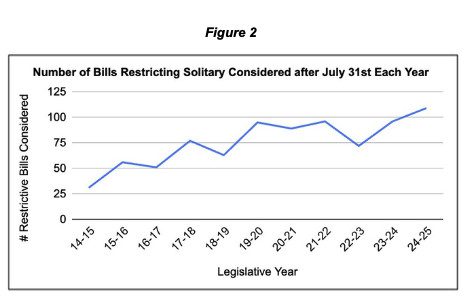In the past year, despite multisector federal funding cuts and an increasingly adverse political climate, the movement to end solitary confinement in the United States achieved some positive legislation across the country. Between July 31st, 2024 and the present day, twenty-nine states have introduced 94 pieces of legislation proposing limitations or restrictions on the use of solitary confinement. Within this same timeframe, twelve states–Arizona, Colorado, Hawai’i, Illinois, Louisiana, Maine, Maryland, Nevada, New Hampshire, Pennsylvania, Virginia, and Utah–have passed such legislation. A number of important bills also made significant progress through the legislative process, posing strong contenders for the next legislative session.
Reporting & Study Laws
In March of 2025, Illinois passed HB4828 into law, which aims to enhance transparency, accountability, and public awareness regarding restrictive housing practices. This law, known as the “Restrictive Housing Data Publication and Verification Act,” requires the Illinois Department of Corrections to publish detailed quarterly and annual reports on the use of restrictive housing, starting July 1, 2025. It requires that these reports include demographic data, reasons for confinement, healthcare access metrics, and information on alternative programs, while ensuring confidentiality. The department must also conduct regular audits to verify data accuracy and collaborate with a third-party research university to improve reporting processes.
In June of 2025, Maine passed LD405 into law, which requires reporting on the uses of segregation (problematically defined in this bill as isolation for at least 22 out of 24 hours) in county jails, regional jails, and state correctional facilities, including the number of people who were segregated, the total amount of time they were segregated, and the reason why they were separated. It also gives the joint standing committee of the Legislature authority to submit legislation to address any issues raised by the report.
Also in June, Maryland passed HB350 into law, requiring the Department of Public Safety and Correctional Services to submit a report on the treatment of transgender incarcerated people to the budget committees before receiving funds appropriated for the department’s general administration. The act establishes that this report shall contain data on the housing placements of transgender people, the number and share of transgender people vs. cisgender people in restrictive housing and the reason for such placements, and the average and median length of time transgender people are held in restrictive housing. It also requires data on the annual number of requests by transgender people to transfer housing and the annual number of housing placement assessments for transgender people.
Pennsylvania enacted HR142 in June of 2025 as well, which directs the Joint State Government Commission to conduct a study and issue a report on best practices and recommendations for the operation of youth detention centers, including ways to restrict the use of staff overtime while also considering how staffing levels will impact the use of isolation, solitary confinement, or other harmful practices.
In July of 2025, Arizona passed SB1507 into law. This act creates the state’s first independent correctional oversight office, granting the oversight body unrestricted facility access, establishing mandatory death investigations, requiring public reporting, and setting up direct legislative accountability. It establishes annual reporting requirements for the office, which must include data on the number of people who were placed in restrictive housing, administrative segregation, or solitary confinement in each facility as well as the duration of each placement.
Conditions Laws
In the summer of 2024, New Hampshire passed SB591, which expands the definition of isolated confinement used in youth development centers and sets settlement amounts for claims of abuse concerning isolated confinement. In the summer of 2025, multiple states have also codified conditions bills. Colorado passed HB1013, which establishes that the DOC shall not deprive a person of visitation rights while the person is in restrictive housing; however, the DOC can limit visitation for an incarcerated person who is in restrictive housing for a maximum of thirty consecutive calendar days. This act establishes that the DOC shall not limit telephone calls for an incarcerated person who is in restrictive housing to fewer than one telephone call every five calendar days, and that it shall not deny a person the ability to file a grievance because that person is in restrictive housing or has restricted privileges. It requires the department to take reasonable measures to increase phone calls and non contact visits for all people who are in restrictive housing, and it requires the department to increase the availability of broadband internet in restrictive housing cells.
Louisiana passed HB457, which provides that any person in a penal or correctional institution who is placed into solitary confinement shall be provided access to all educational materials they would otherwise have access to in the least restrictive housing available at the institution. It also establishes that the supervisor with the highest level of authority who is present at the institution shall provide such educational materials to the person within 24 hours of placement in solitary confinement, regardless of the actions of the person, including but not limited to the failure to request such materials. Lastly, Nevada passed AB167 into law, which builds upon standing law governing the review of corrective room restriction beyond 24 hours in youth detention facilities by adding that the review must be conducted by a member of the staff and must assess whether a referral to a mental health screening, evaluation, or treatment is necessary.
An additional conditions development this year involved standing law enacted last year that restricts solitary confinement in New York City. In January 2024, the New York City Council overrode a Mayoral veto to enact Local Law 42, which bans all forms of solitary beyond four hours and otherwise requires all people in city jails to have access to at least 14 hours of daily group out-of-cell time. In June 2024, the jails oversight body enacted regulations to implement the law. The law and regulations went into effect in July 2024, though the Mayor issued illegal executive orders suspending major components of the law. In June 2025, a court threw out those illegal orders, finding that they usurped the democratic process. Currently, a federal judge has
temporarily stayed implementation of portions of the law as litigation continues.
Vulnerable Populations Laws
In October of 2024, Pennsylvania passed HB1509, which protects pregnant or postpartum children in state-licensed facilities, specifically restricting practices like seclusion and exclusion. It prohibits placing pregnant or postpartum children in seclusion and limits the use of exclusion to situations where there is an immediate risk of physical harm. It requires that exclusion decisions are documented and approved by facility leadership, and exclusion periods must align with departmental regulations. Further, it mandates training for facility staff on the specific needs and health impacts on pregnant or postpartum children, covering topics such as the risks of restraints, the effects of isolation, and the implications of invasive searches. Overall, this act seeks to create a more trauma-informed environment, minimizing practices that could retraumatize or endanger pregnant or postpartum individuals.
In March of 2025, Utah passed SB0024 into law, which amends the state’s definition of child abuse to include any conduct involving unreasonably subjecting a child to solitary confinement. Although this bill does not concern any specific type of correctional facility, it is positive nonetheless. In May of 2025, Virginia passed HB2235, which requires that deputy sheriffs and jail officers employed in local and regional correctional facilities who have contact with pregnant incarcerated people must be trained on the impact of being placed in restrictive housing or solitary confinement on pregnant incarcerated people. Finally, in June of 2025, Hawai’i passed SB694, which strikes out standing law that allows young people to be held in a lockup for adults if “in the interest of justice.”
Another piece of positive legislation concerning vulnerable populations that passed this year– which also affects minimum conditions and reporting requirements–is Hawai’i SB104. Although SB104 was originally a Mandela bill that included a 15-day limit on the use of solitary, it was significantly weakened by legislative amendments. Some concerns include that the law does not place time limits on the use of solitary and uses a definition of solitary (locked in for 20 or more hours a day) that could allow for solitary by another name. However, the final codified version establishes protections for vulnerable populations (elders, people with any type of disability, people with medical conditions, & LGBTQ people), and creates quarterly and annual reporting requirements. A significant component of this law is that it applies to both state-operated and state-contracted facilities, including in facilities that are contracted by the state of Hawai’i but operated in different states. In June of 2025, the governor of Hawai’i issued a notice of intent to veto SB104. Community Alliance on Prisons, the ACLU of Hawai’i, Dr. Terry Kupers, Dr. Pablo Stewart, and Unlock the Box responded by putting forth an op-ed, published in Civil Beat, that called on the governor to sign SB104 into law and abide by his previously issued executive order to implement trauma-informed care throughout the state’s executive departments. In July, despite his aforementioned intent to veto, the governor officially signed SB104 into law.
Close Calls & Defeated Bills That Tried to Expand Solitary Confinement
Although they did not pass into law, a few strong restrictive bills came very close this year. In April of 2025, the governor of Virginia vetoed companion bills SB1409 and HB2647. This policy would have defined isolated confinement as holding an incarcerated person in a cell for 17 or more hours per day and defined a lockdown as confining an entire unit for 20 or more hours daily. It sought to limit isolated confinement or restorative housing to no more than 15 consecutive days within any 60-day period, except in cases involving medical isolation, protective custody, or facility threats. Before using such confinement for protective purposes, all less restrictive options or transfers were to be exhausted. Individuals placed in protective confinement would have been able to opt out with informed, voluntary refusal, and must be safely relocated within 48 hours. Programs and activities in confinement would have to match those in general population units of similar security level. Continued placement beyond 15 days for behavioral threats would be allowed only if new concerns arise, with reviews every 48 hours. It would have required medical and mental health evaluations within one day of placement. Facilities would have had to document all placements and notify individuals of review outcomes within 24 hours, with the right to appeal. Lockdowns would be restricted to 7 days, not more than once in 30 days, unless approved by a regional administrator, with clear documentation and justification required.
Additionally, in California, AB544 was vetoed by the governor in September of 2024. This bill would have required county elections officials to coordinate in-person voting at each jail, including the creation of a plan for eligible people in administrative segregation or other restricted housing units to engage in such voting procedures.
Other positive strides for the movement include the defeat of bills seeking to expand the use of solitary confinement. In the spring of 2025, New York companion bills A03217 and S2656, which were failed attempts to repeal the HALT Solitary Law, were strongly rejected and died in the Crime Victims, Crime, and Correction Committee.
Active Bills Limiting Solitary
Promising restrictive bills are still in play in certain jurisdictions. The legislatures of the District of Columbia, Massachusetts, New York, and Pennsylvania hold sessions for a period of two years and carry over bills from odd-numbered years to even-numbered years. The 26th Council of DC, the 194th General Court of MA, the 2025-2026 Regular Session of NY, and the 2025-2026 Regular Session of PA all opened in January of 2025 and will close in December of 2026 or January of 2027. More information on each state’s legislative session schedule can be accessed through online resources like StateScape and MultiState. Whether still on the legislative calendar for this year or carried over through legislative recess to the next calendar year, the following bills remain active.
District of Columbia
First introduced in 2022, B26-0028 – titled “Eliminating Restrictive and Segregated Enclosures (‘ERASE’) Solitary Confinement Act of 2025”– aims to fully end solitary confinement. The bill defines “minimum out-of-cell time” as at least eight hours daily between 8 a.m. and 8 p.m., and considers the denial of this standard as “prolonged confinement.” It prohibits the use of prolonged confinement for any purpose—including discipline, safety, healthcare, or suicide prevention—with exceptions for individuals in medical isolation or on suicide watch. The Department is required to provide adequate healthcare to all residents, including those in disciplinary housing or under suicide precautions, and must supply educational materials on mental health and substance use disorders to those in segregated enclosures. Legal counsel must be notified any time an incarcerated individual is placed in segregation. The bill mandates staff observations every 15 minutes for individuals on suicide precaution, and continuous monitoring—documented every 15 minutes—for those on suicide watch. Individuals on suicide precaution may not be placed in safe cells or subjected to prolonged confinement, while those on suicide watch may only be placed in safe cells if necessary to prevent death or serious injury. Mental health professionals must observe individuals in safe cells, and the Department must have procedures in place to transfer them to hospitals when needed. All serious suicide-related incidents must undergo a morbidity and mortality review, including public reporting and policy recommendations. The Department is also required to submit implementation plans within 90 days, update policies within 180 days, and report on the use of segregated enclosures to the Mayor, Council, and Corrections Information Council, making this information publicly available. Finally, the bill grants incarcerated individuals the right to bring legal action in Districtof Columbia courts for violations of the legislation.
Massachusetts
Companion bills S1651 and H2608 aim to uphold basic human rights for incarcerated people. Among other important protections, the bill would generally require that all people incarcerated have access to at least eight hours of daily out of cell time, including at least six hours of daily group programming at least five days a week, and with clear and strong definitions of cell, out of cell, and congregate.
Companion bills S2114 and H3422 aim to establish a jail and prison construction moratorium. They prohibit a state agency or public agency from renovating existing or dormant correctional facilities, excluding the removal of restrictive housing units. H2685 requires all correctional institutions to collect, provide, and publish quarterly data to review and recommend clear limitations on the use of force by correctional officers, including the number of incidents in any form of segregated confinement.
Companion bills S1660 and H2656 require that a person’s identification as part of the LGBTQ+ community shall not be grounds for placement in restrictive housing or removal from the general population. They allow incarcerated people to request removal from the general population for their own safety at any time, and establish that no incarcerated person shall be placed in restrictive housing or removed from the general population for reporting an act of sexual violence in good faith.
S1086 allows incarcerated people, their legal representatives, or correctional staff (at the incarcerated person’s request) to petition a court for transfer out of restrictive housing if they have been held in such conditions for more than 72 hours within a 144-hour period, and if those conditions are not justified by safety concerns or the interests of justice. Once a person exceeds this time in restrictive housing, staff must inform them every 24 hours of their right to petition and offer assistance in filing. If an incarcerated person requests help, staff are required to file the petition within 12 hours. If the petition is submitted to the wrong court, it must be forwarded to the appropriate one. The court may also order regular reviews of the person’s housing status.
New York
Companion bills A01261 and S03763 address systemic violations of the HALT Solitary Law, while expanding protections against solitary, restricting staff use of force, and expanding access to family visits, care packages, and mail. If passed, all incarcerated individuals would have the right to in-person contact visits, with contact visits defined to ensure they are real. Those not in segregated confinement would be entitled to at least 14 hours of out-of-cell time daily, including 7 hours of programming and 2 hours of recreation. The use of restraints would be discouraged, and sentences to segregated confinement would be limited to 15 days. Disciplinary confinement in alternative units (with access to at least seven hours of daily congregate out of cell time) would not exceed 60 days. Additional protections provided by these bills include legal rights in
hearings and credit for time served if not found guilty. This policy would expand public reporting requirements and make even more explicit protections for “special populations” that are already required in the law.
Companion bills S04583 and A04879 prohibit the isolation or segregated confinement of a birthing parent (with or without their child) as a disciplinary tool or sanction. Companion bills S00886 and A03651 limit solitary confinement to a maximum of 15 days and protect the rights of people in solitary to access medical care, legal aid, in-person visits, vocational training, and individualized mental health services. They establish oversight by an independent agency with full access to facilities and records, prohibit cruel treatment, and
require staff training to align with these standards. The bills emphasize proximity to home for incarcerated individuals, protections against retaliation, and equitable remuneration for work programs.
Pennsylvania
SB787 defines solitary confinement as holding someone for 20 or more hours a day and limits its use to no more than 15 consecutive days or 20 days within a 60-day period, even during lockdowns. It requires medical and mental health evaluations before placement and outlines strict hearing, review, and rehabilitation procedures. It bans solitary confinement for vulnerable groups, including those under 21 or over 55, individuals who are disabled, mentally ill, pregnant, postpartum, recently miscarried, or LGBTQ+. It establishes that solitary cannot be used pending investigation unless there’s a safety threat and the chief administrator approves. Facilities must provide out-of-cell time, programming, and care, and are prohibited from releasing individuals directly from solitary into the community. The policy also bans placing individuals together if
there’s a risk of harm and requires alternative disciplinary options. The bill’s oversight measures include an independent investigator, a hearing review board, public reporting, and the right for affected individuals to seek legal relief. The Department of Corrections would be required to issue regulations to enforce these rules.
HB1384 prohibits the use of room confinement for children in youth correctional facilities as a form of punishment, discipline, retaliation, coercion, or convenience during staff shortages. It allows room confinement only as a temporary response—lasting no more than 15 minutes—to behavior that poses a serious risk of harm. Before using confinement, staff must attempt less restrictive interventions such as de-escalation or relocating the child. Staff are required to explain the reason for confinement and inform the child they will be released as soon as they can behave appropriately. Children posing a threat to others must be released within three hours, while those threatening self-harm must be released within 30 minutes. If a child still poses a risk after these time limits, a licensed practitioner must assess the situation and consider alternative treatments, such as inpatient psychiatric care. The bill also prohibits consecutive periods of confinement and mandates that a child’s attorney be notified whenever confinement is used.
Acts Expanding Solitary to Challenge & Bills Expanding Solitary to Monitor
Conversely, there are also a few bills from this past legislative year that threaten to expand or have expanded the use of solitary. In Ohio, HB338 seeks to establish that people incarcerated at a state correctional institution who are in restrictive housing shall not be assigned a tablet for personal use. Such individuals would only be able to use tablets on a shared basis during limited time frames. This bill also aims to establish that sanctions against a person in restrictive housing shall not be reduced due to space limitations in restrictive housing.
Washington passed HB1232 into law in May of 2025. This act, while establishing oversight authority for the Department of Health over Washington’s private detention facilities and defining abuse and neglect in ways that would hypothetically cover the imposition of solitary confinement, also strikes out standing law that prohibits solitary confinement (isolation “for 20 hours or more per day”) in private detention facilities. Although private detention facilities have Although private detention facilities have been almost wholly outlawed in the state of Washington due to the passage of HB1090 in 2021, this law makes exceptions for private detention facilities that are contracted by governmental entities; HB1090 permitted such facilities to continue operating until their pre-2021 contracts conclude. Northwest Detention Center in Tacoma, Washington has been under contract with Immigration and Customs Enforcement (ICE) since 2015–a contract that’s set to expire in September of 2025. However, given the empowerment of ICE and for-profit detention facilities instigated by the Trump administration, the closure of Northwest Detention Center this fall is not likely. The facility’s continued operation is incredibly alarming–not only because it violates Washington state law through blurry and unsubstantiated federal preemption, but also because the facility continues to flagrantly use solitary confinement. In fact, in March of 2024, Charles Leo Daniel died by suicide while in solitary confinement there. Although the effects of HB1132 and the future of Northwest Detention Center are unclear, this legislation reminds us of the reality of the current moment: that the uncontrolled growth of immigration detention will inevitably lead to more people in solitary confinement in addition to countless other harms.
A Year In Review
When considering the political circumstances of this past legislative year, and when comparing it to previous years, it’s clear that the fight to end solitary confinement through changes to state law has remained strong in the 2024-2025 legislative season.
Like most others, this year included bills that negatively aim to increase the use of solitary confinement. However, as illustrated in Figure 1, positively the number of introduced bills seeking to expand solitary this year is significantly lower than in recent years:

Whereas 26 bills expanding solitary were introduced in the 2020-2021 legislative year and 34 such bills were introduced in the 2022-2023 legislative year, just 6 were introduced in the 2024-2025 legislative year. This means that the number of introduced bills aiming to expand solitary confinement is down 82% from two years ago.
At the same time, data positively shows that the number of bills seeking to restrict solitary confinement that are being considered before state legislatures is higher than ever:

As demonstrated in Figure 2, 109 bills restricting solitary confinement have been considered and/or acted on since July 31st, 2024–a higher count than any previous legislative year. Examining Figures 1 and 2 in conjunction, trends indicate that positively state legislators are introducing fewer bills that increase the use of solitary while state legislatures are considering more bills that restrict solitary.
Positive legislative developments this year demonstrate the tenacity of the state campaign advocates on the ground, who consistently show up to meet with legislators, give oral testimonies, and rally outside capitol buildings. The assortment of bills pushing to restrict solitary confinement that were introduced and/or passed in state legislatures this year indicates the ongoing and growing interest of states to meaningfully work towards the abolition of solitary confinement–even in spite of an increasingly carceral federal agenda.
In this vein, the federal End Solitary Confinement Act (ESCA) was reintroduced in the U.S. Senate and House. ESCA aims to limit solitary to four hours and otherwise requires all people, including people in alternative units, to have access to at least 14 hours of daily group out-of-cell time with programming, recreation, and activities.
This past legislative year has been a step in the right direction, enacting stronger transparency and posing positive prospects for the coming sessions. Acknowledging these achievements and continuing to advocate for those bills restricting solitary that are still pending in a few state legislatures, we will not stop fighting until solitary confinement is entirely abolished in the United States.
Unlock the Box is a coalition of organizations and movement leaders who partner with state and local campaigns across the United States with the common goal of ending the use of solitary confinement for all people. Unlock the Box pursues this goal by
working simultaneously on national, state, and local levels with solitary survivors, family
members, advocates, community and faith groups, legislators, healthcare and corrections experts, and others dedicated to ending state-sponsored torture.



